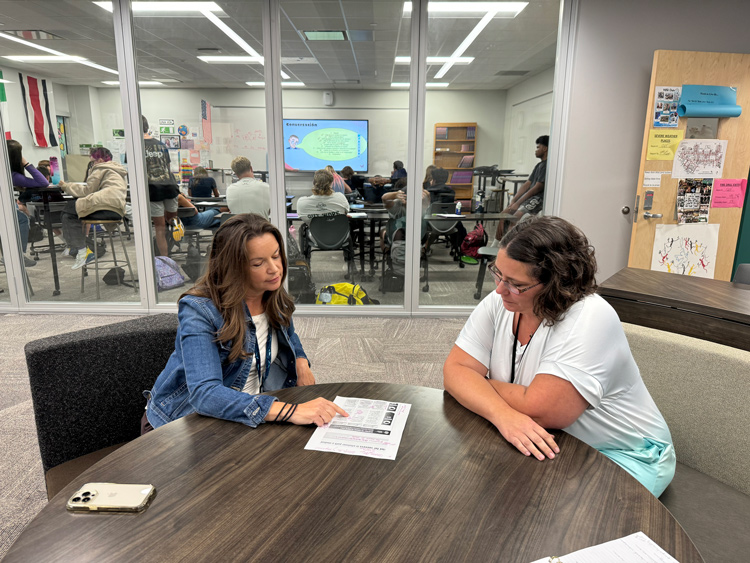Westfield teachers speak out about proposed Indiana diploma requirements
By AMY ADAMS
news@readthereporter.com
In March 2024, when the Indiana Department of Education unveiled a proposed revamp to the requirements for students to obtain high school diplomas, educators across the state took notice.
Westfield High School teachers have been speaking out about the overhaul and their concerns over what they perceive as lowered standards, lack of clarity, and a quick turnaround time. With a recent revision to the initial proposal being announced by the IDOE on Wednesday, Aug. 14, some WHS teachers are glad their voices are being heard but believe there is more work to be done.
The March announcement by the IDOE proposed replacing the current Core 40 requirements and multiple diploma options with a base diploma requiring 42 credits intended to meet goals set forth through Indiana Graduates Prepared to Succeed (GPS). Among other changes, the recently released update adds the option for students to earn honors and technology “seals” to add to the base diploma.
Charlene Heinzman, WHS German teacher and president of the American Association of Teachers of German in Indiana, was present last Wednesday for the rollout of the revised plan. She said she could hear whispers in the background when the announcement was made and quite a few voices saying, “Yes, but …”
“I thought it was very evident right from the get-go that they took the feedback and reworked it because it was very different than draft one,” she said. “They reformatted it to make it more readable and more easily understood, but it still left a lot of questions with a lot of people.”
Heinzman said one of her initial concerns was with the lack of clarity in the original language of the document, and Heinzman wasn’t the only WHS teacher who began expressing apprehensions.
WHS Spanish teacher Jennifer Hasler Troutman said she felt the newly proposed diploma requirements would limit the flexibility of students by forcing them to choose at an early age what course of study they wanted to pursue.
WHS English teacher Dawn Knight said she worries that the new base diploma won’t keep Indiana students competitive in college admissions, both in and out of state.
Chef Nikki Heflin, WHS Family and Consumer Sciences teacher, expressed similar doubts about students being adequately prepared for employment. Having recently been named the American Association of Family and Consumer Sciences Teacher of the Year, she said she doesn’t want to see vital teaching curriculum removed from career and technical programs.
WHS math teacher Andrew Schaaf not only teaches geometry, which all students are required to take, but he also teaches AP Stats and finite math, which appeal to students seeking college entrance, and he teaches a math course at Indiana University. He further understands the perspective of parents because his son is a student of the Class of 2029, which is the first class that will be affected by these new requisites. Schaaf said he believes the proposed base diploma, as it stands, would close doors rather than open them for students.
Because of these and other concerns, Heinzman said a group of WHS teachers went on a world-of-mouth crusade.
“We really wanted to spread the word as much as we could to educate people and let them know what was happening,” Heinzman said.
They encouraged anyone with concerns to fill out the online form provided by the IDOE.
Knight said word of the new plan circulated quickly because it raised so many questions.

WHS English teacher Dawn Knight and German teacher Charlene Heinzman look over proposed requirements for new Indiana high school diplomas. (Reporter photo by Amy Adams)
The teachers said they feel that their initial efforts have paid off. The IDOE received around 8,000 responses from union members, teachers, parents and others across the state. In addition, leaders at Indiana University, Purdue, and other Indiana colleges and universities wrote letters expressing concerns.
“There are places where standards are being lowered,” Knight said. “I don’t know of a situation in my 30 years of teaching when lowering standards is good for kids in any way.”
One area in which the teachers said they feel standards are being lowered is in the lack of a foreign language requirement for students.
“Being able to communicate in other languages and understand other cultures is important for all students, not just those going to college,” Hasler Troutman said. “It needs to be a requirement for all students.”
Hasler Troutman said that teachers of different languages have partnered together through Indiana Foreign Language Teachers Association to express the value to all students of learning a world language, including showing college admissions officers, future employers, and recruiters that students have learned the value of hard work and problem-solving skills.
Though the new diploma plan adds requirements for personal finance and computer science, it changes the requirements for math and science, not requiring courses such as geometry or advanced algebra and chemistry or physics. In addition, the new diploma standards would not mandate that students take economics or world history.
Knight described how a knowledge of world history is important to understanding other subjects. For example, she needs students to have a grasp on history in order for them to understand the context of literature in her English classes.
“I think we’re doing our kids a disservice if we aren’t giving them the more global education they need,” Knight said.
In addition to removing requirements for specific courses, the teachers have questions about the lack of clarity in the wording of the document.
Knight pointed out that the proposal contains the wording, “demonstrates skill development in communication, collaboration, and work ethic,” with no guidelines as to what measures would be put in place to track and sign off on those requirements.
The teachers also still have questions about whether certain elements have been thought through. One example is that there is verbiage about using AP test scores in the application of an honors seal to a diploma, and yet those scores don’t come out until July, while students graduate in May or June.
“It doesn’t matter what the percentage is of kids who want to go to college,” Knight said. “Whoever wants to should be able to compete. That is my concern, that this base diploma does not do what it needs to do.”
However, the teachers agree that these needs apply to all students, not just those who may be college-bound.
Hasler Troutman said that the IDOE has described the new pathway options in terms of three E’s: enrollment, employment, and enlistment, and there is talk that the goal is to make students more career-ready coming right out of high school.
However, Heflin expresses concern that the newly proposed GPS Plus diploma will put more of the educational burden on employers rather than trained teachers.
“We want to make sure we have mandatory robust diploma requirements,” Heflin said. “As career and technical educators, we are always going to support that students are having a really quality education. Students who are career-driven still have to have core requirements because that is what builds a successful employee.”
She went on to say it is unreasonable to expect a freshman to know they want to pursue a career as a chef.
“This will pigeon-hole students into choosing a pathway very early on,” Heflin said. “In reality, high school is a time for students to explore.”
Schaaf acknowledged that the new proposal would allow students to add seals to the base diploma in both honors and technical realms.
“I think that this flexibility is a good thing,” he said, “but there are many details that have to be flushed out. It is important that a seal means something. For it to be meaningful, we have to go through and define what some of these requirements look like. Whether it’s a college or university or an employer, we have to believe that those organizations know what an honor seal means.”

WHS teachers, from left, Nikke Heflin, Dawn Knight, Charlene Heinzman, Jennifer Hasler Troutman, and Andrew Schaaf have spoken out about concerns over newly released requirements for earning an Indiana high school diploma. (Reporter photo by Amy Adams)
Another major concern for teachers is the speed at which decisions are expected to be made. The new diploma requirements are projected to take effect for the class of 2029.
That seems like a long time away. In reality, Schaaf pointed out, it is actually less than a year away because the students in that graduating class start their freshman year next fall in 2025 and need a direction toward which to work.
“I’m not sure this is something that can remotely be done by the end of the year, which is when I understand they want to make a decision about this,” Schaaf said.
Knight also expressed doubts that one more draft will result in the finished product the teachers are desiring.
“I think the biggest concern is the time,” she said. “I’m very glad they’re listening, but I hope we are in drafting-only stages. I hope they continue to listen and say we have to take the time to do this well. We have to ensure that we are doing this in a way that is truly measurable and equitable.”
The teachers encourage parents, students, counselors and concerned community members to continue to push for revisions that will help best prepare students for life after high school and expect a new Jotform to be released soon for feedback.
“They’ve done a lot of work,” Hasler Troutman said. “There’s more work to do.”
To read more about the proposed changes in diploma requirements, go to in.gov/doe/diplomas.

